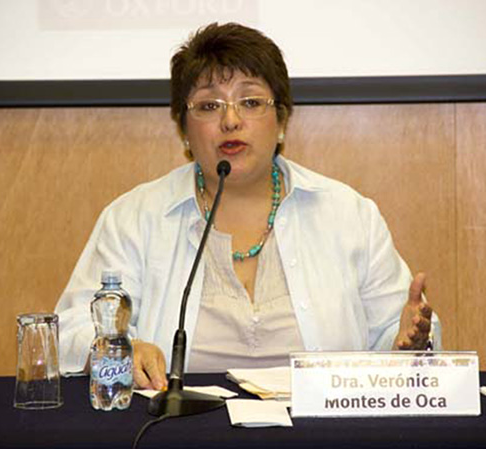2016 Featured Abstracts
Stephanie Baran, University of Wisconsin-Milwaukee
Racism: Is it Just a Right-Wing Phenomenon? An Exploratory Study of Left-Wing Party Affiliation and Color-blind Ideologies
 |
||
In order to examine the association between color-blind ideology, political affiliation and race, this exploratory study analyzes data collected from the 2014 General Social Survey (GSS). The study employs a series of multinomial logistic regressions and predicted probabilities to examine the association between party affiliation, race and color-blind racism ideology. This study finds that white Republicans and Democrats with high school degrees are predicted to have similar beliefs that entail support for color-blind ideologies. Therefore, the distinction that appears to separate Democrats and Republican voters, i.e. advocating racialized ideologies, is perhaps not so distinct. While this study unveils results that corroborate previous studies, future research is needed to assess how white people specifically understand color-blind racism and their attachments to it.
Megan Collier, University of Illinois at Chicago
I Have a Beard but That Doesn’t Mean I’m One of You, Okay?’ Trans* Negotiations of Unintelligibility
 |
||
Social awareness of transgender identities is increasing, however, the interactional process of categorizing gender as either male or female overwhelmingly remains unchanged, limiting the possibilities of recognizable gender. Based on 18 in-depth interviews with a gender-diverse sample of trans*, genderqueer, and gender non-conforming individuals, this paper investigates the tension between personal gender diversity and the social determination of gender. The proliferation of trans* identities necessitates an examination of the moments when “doing” gender does not align with “determining” gender, moments that can render some trans* individuals as socially unintelligible in a binary gender system. I analyze three strategies trans* people use to negotiate unintelligibility: body projects, expanding gendered language, and capitulating to misgendering. These strategies illustrate shifts in the binary at the level of personal identity as well as trans* people’s interventions into existing social processes to actively negotiate alternative gender possibilities. Additionally, unintelligibility has under-studied consequences and the concept of “trans* battle fatigue” highlights the accumulated repercussions for trans* people who cannot achieve access, or do not desire access, to binary gender categories. Institutional and interactional gender-determinations can override personal gender identification, resulting in the contingent legitimacy of identity claims and conflicts over trans* people’s access to public spaces.
San Juanita E. García, University of North Carolina at Chapel Hill, Verónica Montes de Oca, Universidad Nacional Autónoma de México and Rogelio Saenz, University of Texas at San Antonio
 |
 |
 |
| García | Montes de Oca | Rogelio Saenz |
Growing Old and Undocumented – Los Invisibles: The Cumulative Mental Health Disadvantages among Older Mexican Immigrants
Immigration policies shape how immigrants and their children are integrated into the United States. Much of the immigration debate has centered on claims to “fix the immigration problem.” The solutions proposed have favored enforcement policies, including mass deportations and the militarization of the U.S.-Mexico border. Other solutions have focused on providing deportation relief to undocumented young adults. However less is known about the cumulative mental health disadvantages associated with growing old as an undocumented immigrant in the U.S. Using in-depth interviews with individuals of fifty years and older residing in the Mexican states of Guanajuato and Zacatecas and three U.S. states: Texas, California, and Illinois, we examine the challenges faced by older immigrants and their concerns for “growing old” as undocumented immigrants and the consequences on their mental health. This paper sheds light on a group that is often excluded from immigration and healthcare policy debates.
Marina Litvinsky, University of Southern California
 |
||
From Hippies and Cholos to Techies and Hobos: Gentrification and Selling Cool in Venice, CA
This paper interrogates the impact of gentrification in the beachside neighborhood of Venice, California. Venice has experienced a great deal of change in its century of existence. From a Coney Island of the West, to a center of counterculture and a ghetto by the sea, Venice is now increasingly becoming a hipster haven, a playground for the rich and a developer’s dream. I examine these changes in the context of Venice’s culture and image as seen through the eyes of its residents. What I find is that the physical and cultural changes in Venice, spurned on by the commodification of its land, are increasingly making Venice an exclusive commodity and place. Previously, Venice’s culture was organic, it arose out of the people that were there and accepted everyone with open arms. Now, the high fences and large, looming mansions that take away neighbors’ sunlight and view, detract, rather than attract neighbors and community. This alienates many residents and completely reconfigures the ethos of Venice, which was based on tenets of inclusivity, acceptance and community. Looking at the techies, Venice newcomers who are appropriating the image of Venice cool from the bohemians and artists as their own, reveals a Venice that is becoming racially and economically homogenized.
Maria G. Rendon, University of California, Irvine, Adriana Aldana, California State University, Dominquez Hills and Laureen Hom, University of California, Irvine
 |
 |
 |
|
| Rendon | Aldana | Hom |
Latinos Framing Race in a Colorblind Era: Making Sense of Criminalization in the Inner City
High rates of incarceration and ongoing police abuse captured in social media has renewed attention to the criminalization of urban, young men of color, reawakening a sense of race consciousness reflected in the Black Lives Matter movement. We draw attention to the criminalization of Latino young men in segregated poor, urban neighborhoods as a long-standing “racial project,” reinvigorated in an era of mass incarceration that functions to racialize the group. We examine how inner city, Latino young men experience criminalization and make sense of this process, specifically the extent to which they perceive this through a racial lens. We draw on in-depth interviews with forty-two Latino young men from two high poverty neighborhoods in Los Angeles conducted in 2007 and a follow up study with half of these young men in 2012. We find Latinos’ hypersegregation structures their criminalization and racialization, while paradoxically sustaining a colorblind ideology. Holding strongly to meritocratic ideals and framing racism as blatant acts of interpersonal prejudice, inner city Latino young men disregard criminalization as a function of race. Internal dynamics in urban neighborhoods further obscures their racialization. Gang-related violence in these communities justifies police presence in the minds of many residents, while moral boundaries drawn against the “gang” label reinforce a dichotomy between criminal and noncriminal young men, normalizing criminalization. We find a race framework emerges for young men who step out of their urban neighborhoods, particularly into white spaces, and discover they are uniformly categorized and “othered” as a function of their zip code or association to the criminalized inner city. As a result, respondents more likely to traverse urban space were those most likely to emerge in racial consciousness, whereas the most economically stagnant, “locked in place” and most subject to criminalization, normalize this process and sustain a colorblind lens minimizing the role of race.
